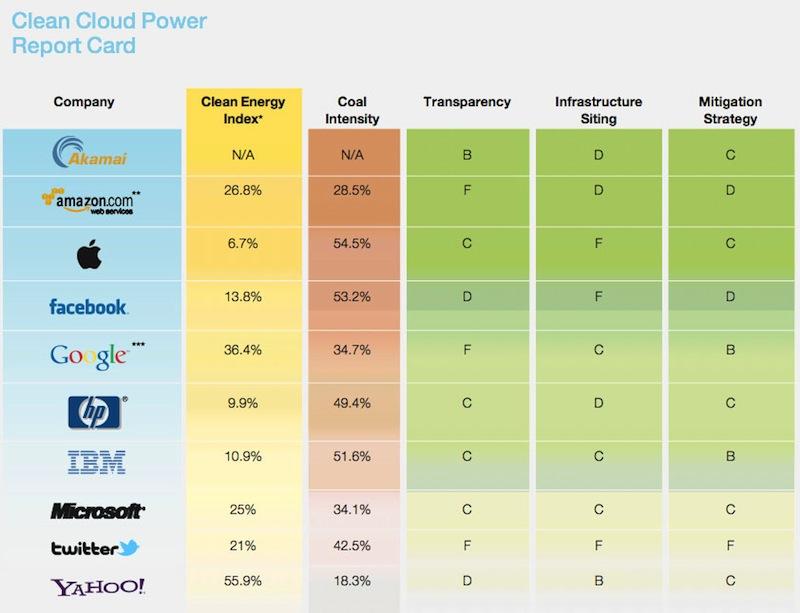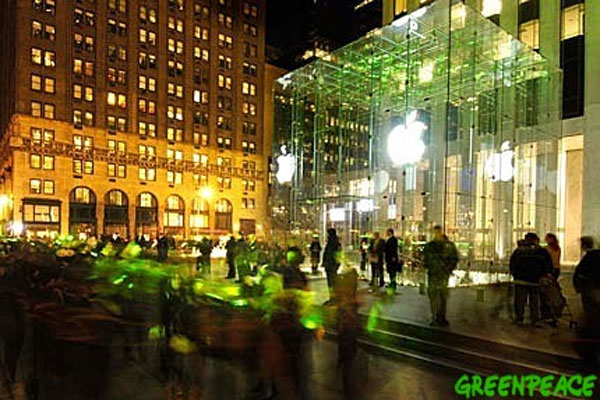Greenpeace 'dirty data' report criticizes Apple's NC data center
In a report titled "How dirty is your data?", Greenpeace rated Apple as having the lowest Clean Energy Index and the highest Coal Intensity among tech giants such as Facebook, Google, Microsoft and Amazon. Apple also received a 'C' for Transparency, an 'F' for instrastructure Siting and a 'C' for Mitigation Strategy on the environmental group's "Clean Cloud Power Report Card."
Apple, along with Facebook and Google, was criticized for contributing to a "dirty data triangle" in North Carolina, where substantial tax incentives from the state have attracted billions of dollars in data center investments from tech companies.
"Apple’s decision to locate its iDataCenter in North Carolina, which has an electrical grid among the dirtiest in the country (61% coal, 31% nuclear45), indicates a lack of a corporate commitment to clean energy supply for its cloud operations," the report said.
Greenpeace estimates that Apple's $1 billion, 500,000 square-foot facility will require 100MW of electricity at full capacity, which could as much as triple the company's energy usage. Reports have also suggested that Apple plans to double the size of the facility to a massive one million square feet.
Apple's data center in Maiden, N.C. was scheduled to begin operations by the end of last year, but has been met with unspecified delays. In February, the company revealed that the server farm will be used for iTunes and MobileMe when it opens this spring.
Reports emerged on Thursday that Apple has completed work on a cloud-based iTunes music streaming service that will allow users to store their music collections via Internet-connected devices.
Last year, Greenpeace rated Apple the greenest electronics maker. In years past, Apple had been taken to task by the group for its lack of transparency and use of toxic chemicals.
For instance, in 2006, Greenpeace gave Apple a 2.7 out of 10 environmental-friendly rating, with low marks for recycling and its take-back programs.
Greenpeace then launched a "Green my Apple" campaign at the Mac Expo in London, though the group was forced to close its booth after a dispute with the show's organizers.
In 2007, the environmental advocacy group organized a publicity stunt that consisted of shining green spotlights on the 32-foot glass cube at Apple's flagship on Fifth Avenue in New York City.
Apple Chief Executive Steve Jobs eventually capitulated in May 2007 by releasing a timetable for Apple's efforts to improve its environmental track record.
"Apple has been criticized by some environmental organizations for not being a leader in removing toxic chemicals from its new products, and for not aggressively or properly recycling its old products," said Jobs. "Upon investigating Apple’s current practices and progress towards these goals, I was surprised to learn that in many cases Apple is ahead of, or will soon be ahead of, most of its competitors in these areas."
As evidenced by last year's rating from Greenpeace the company's new policy has largely been successful. Apple announced that the percentage of total weight recycled as compared to the weight of sales 7 years prior was 66.4 percent in 2009, easily surpassing its goal of 24 percent.
In its most recent report, however, even as Greenpeace praised Apple for becoming "increasingly transparent about the environmental footprint and operational performance of its products," the group took Apple to task for not being as forthcoming about its data center and future plans for the cloud.
 Josh Ong
Josh Ong












 Mike Wuerthele
Mike Wuerthele
 Malcolm Owen
Malcolm Owen
 Chip Loder
Chip Loder

 William Gallagher
William Gallagher
 Christine McKee
Christine McKee
 Michael Stroup
Michael Stroup
 William Gallagher and Mike Wuerthele
William Gallagher and Mike Wuerthele







